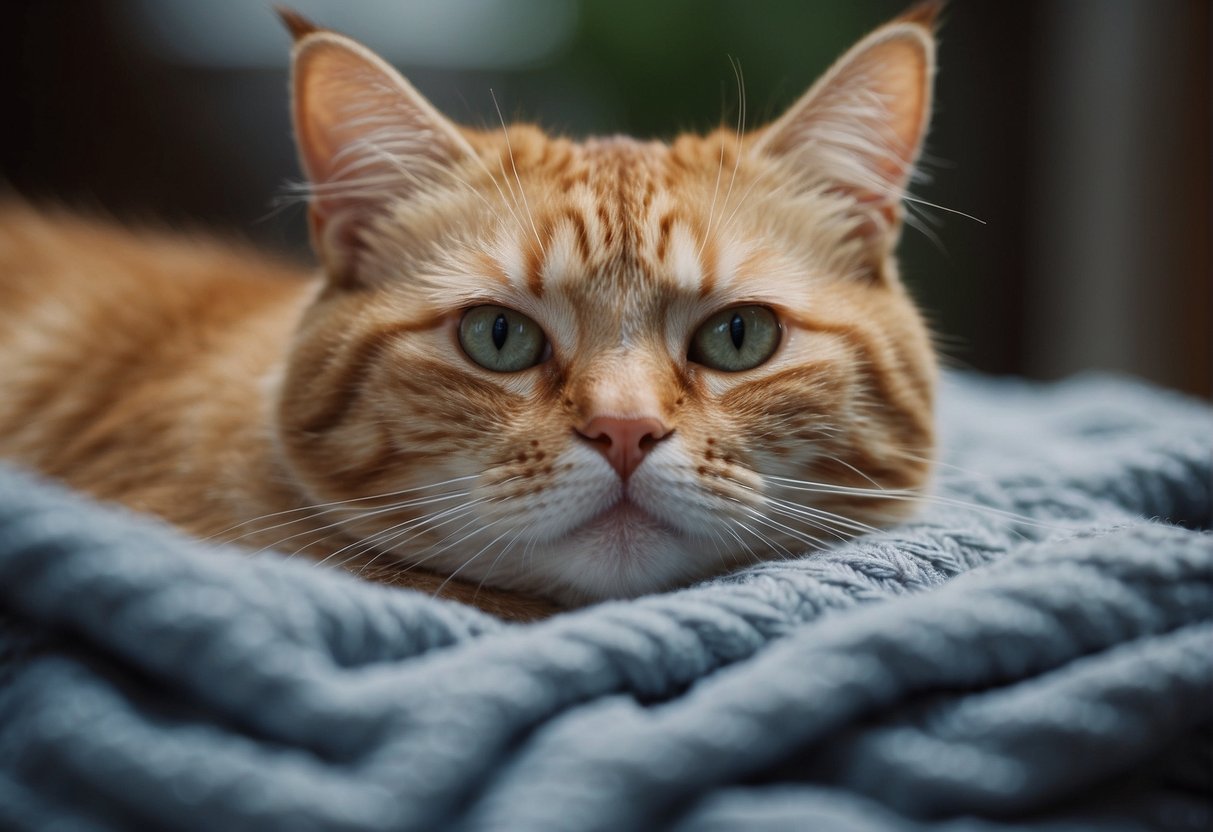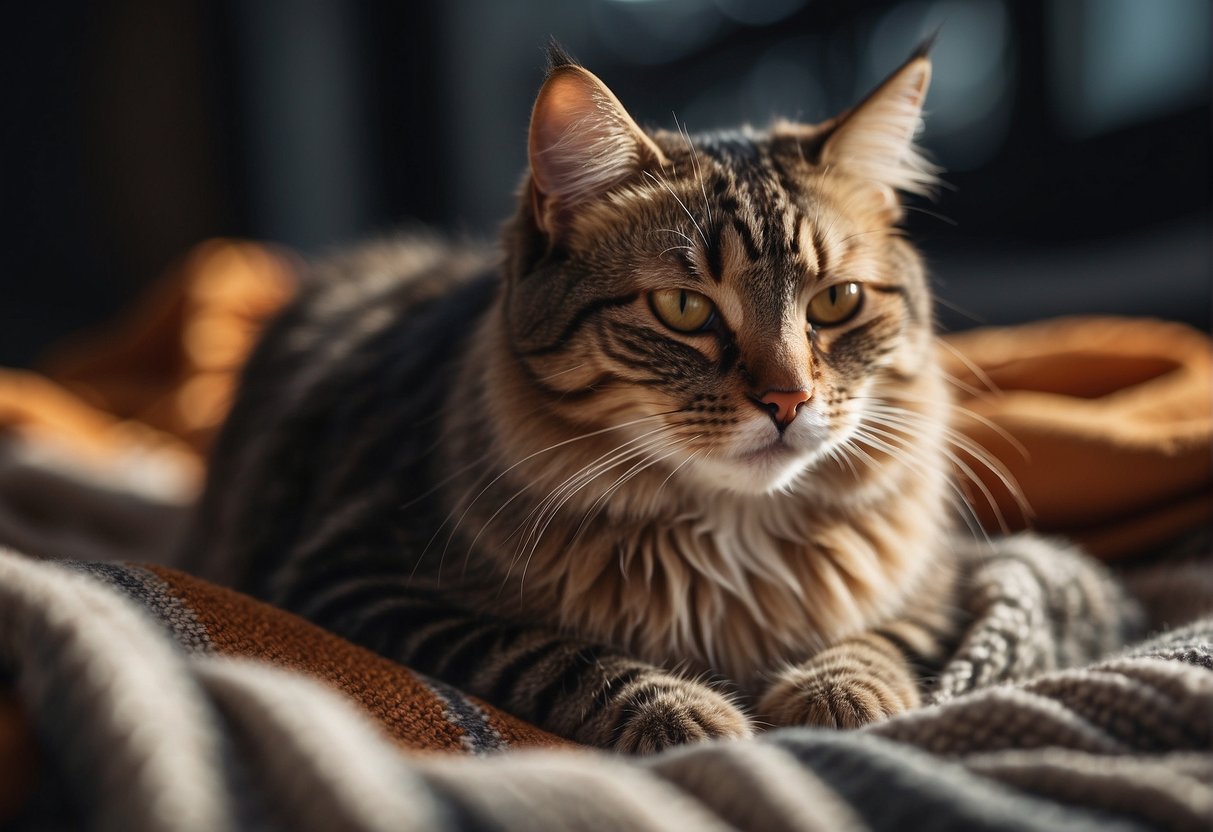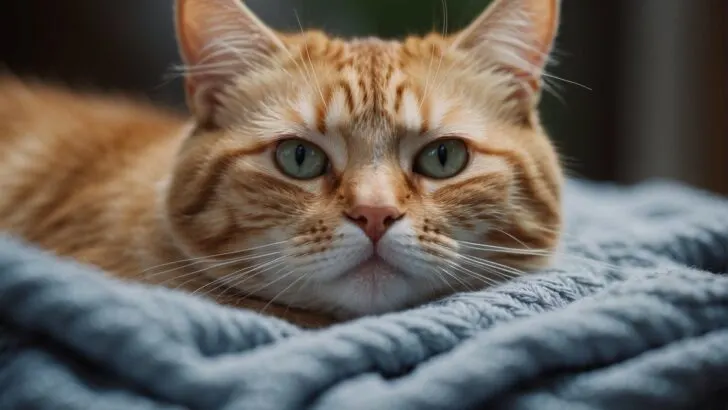If your cat is sucking on your blanket, you’re witnessing a comforting habit that many feline owners observe. This behavior often stems from a cat’s kittenhood when suckling on their mother provided not only nutrition but also a sense of security and comfort.
Having experienced this in my own household, one of my cats would frequently turn to a soft throw on the couch as a sort of pacifier whenever the house was bustling with guests, demonstrating a search for calm in the midst of chaos.

The act of blanket sucking can also be associated with the cat’s natural kneading behavior, where they press their paws alternately.
This action hearkens back to the motions kittens make to stimulate their mother’s milk flow. Watching my cat repeatedly choose the same blanket for this activity suggests that beyond comfort, there may be a scent or texture that is especially appealing or reminiscent of their early nurturing experiences.
While most of the time, this behavior is perfectly harmless and can even be endearing, if it becomes obsessive or is accompanied by other changes in behavior, it might be worth a conversation with your vet.
However, for most cat owners, such quirks are simply part of the delightful package of behaviors that make our feline friends so unique and loved.
Cat Sucking Behavior Explained

When your furry companion starts sucking on blankets, it’s more than a quirky habit; it’s a window into their natural instincts and emotional world.
Suckling Instincts and Kittenhood
Cats often carry behaviors from their kitten days into adulthood. Suckling on blankets is one such behavior, rooted in the comforting experience of nursing. It’s not uncommon for kittens who were weaned off their mother’s milk too early to exhibit this behavior, as it replicates the nurturing they received as babies.
Comfort and Self-Soothing Habits
For many cats, blanket sucking is simply a way to self-soothe. Just as humans have various methods for stress relief, cats may turn to suckling on blankets to feel relaxed or comforted. It’s the kitty equivalent of snuggling up with a childhood teddy bear.
Boredom and the Need for Stimulation
A lack of stimulation can lead to behaviors like blanket sucking. Cats are intelligent and need regular activities to keep their minds engaged. Without sufficient stimulation, they might resort to repetitive behaviors, including suckling, as a form of play or self-entertainment.
Health and Development Concerns
When your cat exhibits behavior like blanket sucking, it’s important to consider their early life experiences and potential health implications.
Weaning and Nursing Patterns
As a kitten, your cat learned and adapted behaviors essential for survival, such as nursing from their mother. Nursing is more than just a feeding mechanism; it’s a comforting action that releases feel-good hormones.
Kittens normally transition from their mother’s milk to solid food through a gradual process called weaning. If your kitten was weaned too early, it might not have fully adapted to the absence of its mother’s comfort. In such cases, your cat may be more prone to suck on blankets to recreate the nurturing experience.
Potential Health Issues
While often harmless, persistent blanket sucking can signal underlying health problems. If you notice this behavior accompanied by changes in appetite, mood, or activity levels, it might be more than a quirky habit. In some cases, it could be indicative of medical issues such as separation anxiety or compulsive disorders.
A sudden onset of such behavior warrants a trip to the veterinarian to rule out these concerns. Moreover, continuous chewing and sucking could lead to the ingestion of foreign materials, causing intestinal issues.
Managing Sucking Behaviors
If your cat has developed a habit of sucking on blankets, it’s important to consider ways to manage this behavior for their well-being. Proper management can reduce the frequency of this behavior and keep your cat content.
Creating a Stimulating Environment
To promote a healthy and satisfying lifestyle for your cat, focus on enrichment and mental stimulation. This can help minimize unwanted behaviors, such as blanket sucking, by keeping their minds occupied.
- Interactive Toys: Provide a variety of toys that mimic prey, such as feather wands or laser pointers, to engage their natural hunting instincts.
- Playtime: Dedicate time each day for active play with your cat. This shared activity not only acts as a distraction but also strengthens your bond.
- Climbing Opportunities: Cats love vertical spaces, so cat trees or wall shelves can offer exploration and exercise opportunities.
- Puzzles and Feeders: These can encourage problem-solving and slow down eating, providing both mental and physical engagement.
When to Consult a Professional
Although providing a stimulating environment can be very effective, there are scenarios where professional advice is necessary:
- Persistent Behaviors: If your cat continues to suck on blankets despite environmental changes, it could be a sign of deeper issues.
- Possible Health Concerns: Should the behavior be accompanied by changes in appetite, weight, or activity level, consult your veterinarian.
- Emotional Distress: In cases where anxiety or stress is suspected, a veterinary behaviorist can offer insights tailored to your cat’s needs.

My name is James, and welcome to FAQCats!
Along with our team of cat owners, expert pet enthusiasts, and pet professionals, we aim to write engaging helpful, engaging content about cats. At FAQCats we strive to provide content that’s accurate and fun to read. Our team writes about everything related to cats; even the most complex of topics. Through extensive research and caring for our own fur-pals, we’re able to provide something cat owners worldwide will love. Have a look around, and leave us feedback anytime!

